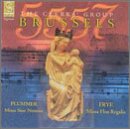| All Artists: Sarum Chant, Walter Frye, Johannes Bedyngham, Anonymous, John Plummer, Edward Wickham, The Clerks' Group Title: Brussels 5557 Members Wishing: 1 Total Copies: 0 Label: Signum UK Release Date: 6/24/2000 Album Type: Import Genres: Pop, Classical Styles: Vocal Pop, Opera & Classical Vocal, Historical Periods, Early Music Number of Discs: 1 SwapaCD Credits: 1 UPCs: 675754223229, 635212001523, 669910053164 |
Search - Sarum Chant, Walter Frye, Johannes Bedyngham :: Brussels 5557
 | Sarum Chant, Walter Frye, Johannes Bedyngham Brussels 5557 Genres: Pop, Classical
|
Larger Image |
CD Details |
CD ReviewsA C Change into Something Rich and Fair Giordano Bruno | Wherever I am, I am. | 11/19/2008 (5 out of 5 stars) "Naming a CD after a tattered manuscript in a Belgian library isn't likely to set off a new trend in aggressive marketing. Nevertheless, this is a "must-hear" performance by the most consistently brilliant vocal ensemble on the stage today.
Manuscript 5557 is a composite batched together from various origins over the centuries. It's a major source of compositions by the greatest Burgundian and French composers of the 15th Century, including works by Dufay, Busnois, and Ockeghem. The core manuscript, however, was English, a selection of masses and motets compiled and illuminated for the marriage of Charles the Bold of Burgundy and Margaret of York, in 1468. The music was not newly composed; it clearly represented a selection of "the best" of English polyphony from several decades past. Almost no biographical details are known about the three composers included on this CD, Walter Frye (d.1475), John Bedyngham (1422-1460), and John Plummer (d. 1487). They were probably all members of the London Guild of Parish Clerks. Bedyngham's songs with English texts, some of which are included on this recording although they are not from Brussels 5557, must have been popular on the continent, since most of the surviving manuscripts of them have French or Italian texts imposed on them. It was a standard joke in the history department, when I studied Ren-Med decades ago, that the Renaissance didn't reach England until it was nearly over elsewhere. When I taught music workshops in San Rafael CA, I delighted in producing faculty recitals in the old Franciscan Mission San Rafael; judging by the archives there of parchment choir books and images of the Guidonian Hand, I jested that the Renaissance reached its maximum expansion in California in 1815. But the joke is on us. It can be argued that the Renaissance began in England, musically, in the early 15th Century, with composers like Dunstaple, Frye, and Plummer, whose development of modally flexible polyphony and an expanded harmonic vocabulary opened the way for the great Franco-Flemish composers of the next generation, the first ever to establish an international style and theory of music for all Europe. The Frye mass Flos Regalis sounds remarkably like Ockeghem, and very fine Ockeghem at that! Frye was radically free in his treatment of the cantus firmus "tenor" which had delimited the melodic choices available to Medieval polyphonists. From Ciconia to Frye, for instance, is a larger melodic leap than from Brahms to Stravinsky. John Plummer's Missa Sine Nomine (without name) will surely sound eccentric and irrational to first-time listeners. It is eccentric, but far from irrational. Plummer employed more or less constant oscillations in mode, pushing the "rules" of harmonic ficta to their extremes with flat signs on E's, A's, and even D's, well beyond the standard practices of his era. The result is a kind of progressing polymodality. You might think of it this way: Plummer was stretching harmonic theory in ways that were briefly available, in the 1450s, but that became moot as theory evolved in a different direction. Playing the game of contrafactual history, think what might have happened if the "contenance angloise" that Dufay learned from Dunstaple had been learned from Plummer instead. We'd all be living in a musical 'parallel universe' today. If any music has the power to waft the listener away to a stained-glass illuminated Gothic Cathedral, this is it. Trust me, you needn't understand a word of what I've written so far in order to find this ethereal music achingly beautiful. Every recording from the Clerks' Group is a major triumph. Their performances of Josquin and Ockeghem are the gold standard of consort singing. Don't overlook this masterpiece of polyphony merely because of its obscure title." |

 Track Listings (16) - Disc #1
Track Listings (16) - Disc #1